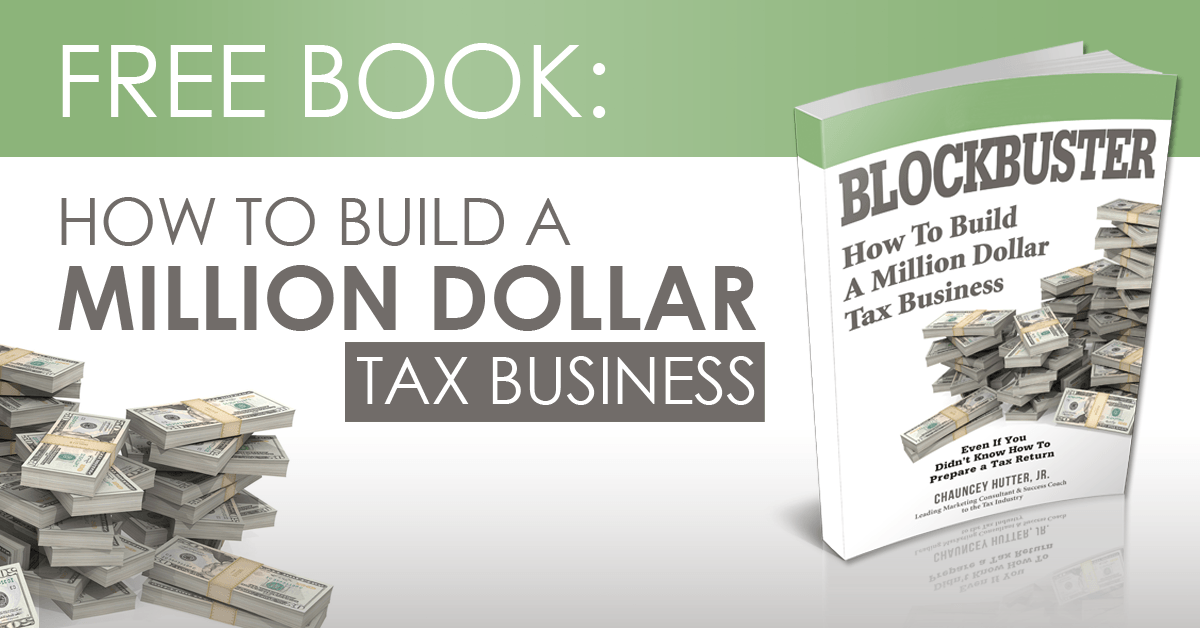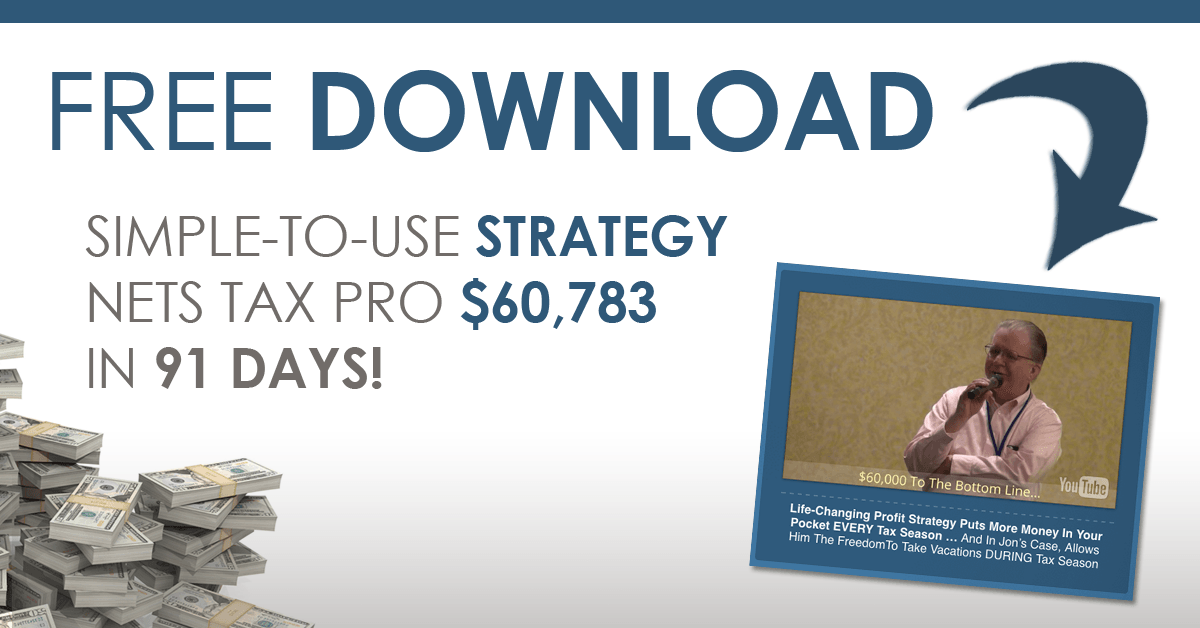Real Tax Business Success
Lesson - 5
Avoid BIG Mistakes in Identifying
Target Markets:
Author: Chauncey Hutter Jr.
This might be a startler for you…
Target ONLY small markets!
Yes, I said, “Target only small markets!” You don’t normally hear this coming from people talking about advertising. You mostly hear people say stuff like, “If I place this ad, it’ll hit fifty thousand people”, or “I can place this ad and it gets to everyone in the surrounding three counties.”
But the truth is this is NOT the way successful savvy marketers operate. If you are a small tax business owner you don’t necessarily want to hit a hundred thousand people with your marketing message on some TV ad. The bigger the blanket or the more people you can reach at one time is not always the objective. It gets extremely expensive and you end up wasting more money than you care to admit advertising this way. Successful marketers understand this and decide to at least start out a different way.
If everyone is your client then, realistically, no one is your client!
As a small business owner you need to spend your time finding small markets to target. Small groups of people to get at. If you can find them, they will be much less expensive to get and you’ll cut down on a tremendous amount of advertising waste.
Your target markets should be small enough so the marketing resources you commit will have a huge impact. What you don’t want to do is waste your marketing dollars by spitting into the Atlantic Ocean.
When you promote your tax business, you want to be THE big fish in a small pond!
Let me explain what I mean in more detail.
Going back to tax business owners being too broad with their marketing and wanting to send their message out all over the place and hope something sticks…That just is NOT what you want to do! You want to select a small market (like we’ve talked about) so you can become a dominant player in that small niche. The big fish will win out more times than not!
Here’s an example:
You happen to have a contact at this blue collar factory with 3,000 workers. You have an “in” with some managers and they can get your promotional fliers up for you in all the break rooms. They also can get your promotional coupon in the company’s w-2 envelopes they’re handing out at the end of January. You promote a special Saturday morning tax seminar in early January for employees on what to do with their company retirement plan.
Do you get the point? You are dominating that small market in that factory. If an employee is going to pay a tax practitioner this year to help them with their taxes, you will (at least) have an opportunity to get the business much more so than some other tax business.
There will be others who may be advertising, and their message will get out to those people, but you’re the dominant player (in their minds) because you’ve specifically targeted “their world” and the group they hang out with.
Now do you only target that one market for your whole tax season? Absolutely not. You want to pick two, three, five, 10 or however many small markets you can realistically keep track of. They either will fit the description of someone who already wants what tax services you’re offering, or you’ll see you need to offer a new kind of tax service in order to give them what they WANT.
Another example of being a big fish in a small pond could be the neighborhoods right around your office. (You always want to start your promoting in your own backyard.) You can do the same thing by advertising or sponsoring in the neighborhood newsletter during tax season. Having high school kids drop off door hangers on all the doors, offering some kind of Saturday afternoon, “take a break from your yard work and come see how not to pay any taxes” seminar. Or even set up a party around the holidays in a nice house in the neighborhood and offer a “FREE tax tips for the new year” get together.
Look, there are hundreds of “small markets” where you can be a “big fish in a small pond” in and around your town.
How about the local organizations you currently belong to. (OR you have close friends you can use as contacts to get you “in” the organizations THEY are involved in.)
What about your church? (I’ve got a client who has built a large tax practice by doing nothing more than promoting himself to individual churches, one at a time. Over the past few years I think he has “niche marketed” to over 100 different churches in and around his area.)
I bet the parents at your kids’ schools pay taxes. There’s nothing wrong with being the “tax specialist” at their schools.
OK, you get the idea. Let’s get even more specific..
There’s riches in niches.
“Discriminating” is a good word when you are marketing. (I’m referring to CHOOSING here!) When you discriminate you are saying you do NOT want to talk to a certain kind of person or group of people—with your marketing dollars!
Getting specific and selecting a “narrowed down” group is good in marketing because the more “laser beamed” and focused you can get, the better your “market to message” match will be. Meaning chances for success increase greatly!
If you know who that person is and you know what that person wants, you’ll be able to discriminate more effectively and vastly increase your response rates for your target group.
If you really want to dominate a small market, you’ll find a “niche group” of people you have a natural AFFINITY with.
Like I’ve already said, it’s very good to target small markets and be the big fish in a small pond. But your marketing job becomes infinitely easier when you have an affinity with your targeted “niche” market.
You don’t PERSONALLY have to have an exact (or tight) affinity with a group (even though it’s better if you do). Your association may be a little distant but you can still make it work.
If you use the church example, your children’s school example or some other association you’re involved with as an example, when you write the ad you want to make your sales copy scream, “Hey, I’m one of you! Let me tell you how I can help you better than those other tax professionals.”
Now that you have them on YOUR side, the marketing process becomes easier.
Here’s an example of not having an exact affinity with a market, but it’s good enough.
Maybe your spouse is some type of professional in the medical profession and they have contacts in the hospital. You can write a sales letter that goes out to everybody in the hospital describing how you know about their frustration and you understand their pain and it relates to figuring out the new tax laws in the medical profession. You can do all this because you hear about it every day from your wife.
Showing empathy towards your target market and being able to “tie your story” as close to where they live, eat and breathe will dramatically increase your sales numbers!
Bill Clinton: (A smart marketer. Politics—won’t go there. Now.) “I feel your pain” sounded stupid to many of us at the time. But it won over the “target groups” of voters he was talking to. Ol’ Bill used AFFINITY marketing to get elected twice! Showing empathy to the voters will get you some votes.
Apply the same principle to your tax business. The same is true when you’re marketing to a targeted group (you’re at least trying to have an affinity with). If you can talk about how much pain you know they are in from working in their industry. If you can empathize with how their tax situation is constantly changing and how it’s so hard to deal with, you’ll have a very RESPONSIVE market on your hands!
Then you go on to say, “Hey, that’s why I specialize in this kind of work! Tax preparation for people like you who need help from a tax professional like me. I KNOW your situation and the tax implications for it. I specialize in that kind of work and I give special discounts for people in this industry.” (And I give free this, and complimentary that, ONLY for people in “our” group etc.)
You are talking to them. You have an affinity with them! You understand their pain and frustration. People love doing business with people they have a bond with.
Whether you agree people should or shouldn’t do business like this is not the point. The point is people are going to give their money to other people for services rendered (ie. taxes), so it might as well be YOU getting some of it.
It’s good to be a specialist (or look like one).
Do you ever get referred to a Specialist from a “General Practitioner” doctor? Usually it takes a LOT longer to see a Specialist than a GP.
And being a specialist or perceived as a specialist can turn an ordinary tax business into an EXTRAORDINARY tax business just by changing the “positioning” of your marketing a little. Higher prices can be charged, higher margins will be enjoyed and being a specialist will help give you the “competitive differentiation” you’ll need to make the sales! (The “big fish in a small pond” approach works even better when you say you specialize.)
When you target small markets, you’ll be promoting offers to groups like doctors or lawyers or any other kind of specific profession. You’ll be promoting to certain apartment complexes within a three mile radius because they are “so close to our tax office, we’re giving out special deals.” (You could have five or six housing complexes you specialize in because they are so close to you.)
Or going back to the church example. You could promote yourself to the 30 churches in your city as the “tax professional specializing in helping people in our local church congregations” within a 20 mile radius of your office.
Again, all of these examples are just breaking down larger markets into smaller markets to help specific niche groups feel like you are talking specifically to them. This will always help you match your message with your market. The tighter the fit, the more success you’ll have!
Remember, if targeting these smaller groups is the ONLY thing that causes your potential prospect to pick up the phone and at least give you a call, that’s great! That’s the only job of your advertising anyway, to get you the phone call.
Keep thinking of ways you as a tax professional can POSITION yourself as a specialist to multiple niche markets in your area. Each tax business owner is different. Take whatever advantages you have where you are and use them!
Chauncey Hutter Jr.
Tax Marketing Expert
Chauncey Hutter, Jr, is a best-selling author and leading marketing consultant and success coach to the tax industry. Mr. Hutter grew his father’s $50,000 per year tax preparation business to a multi-million dollar empire with 24 locations, 400+ employees and over 27,000 tax clients all coming from his marketing campaigns.
For more info on Real Tax Business Success, go to www.taxmarketing.com
© Real Tax Business Success Crash Course



Real Tax Business Success
205 2nd Street S.W. Charlottesville, VA 22902
Phone (434) 293-2707 Email chauncey@taxmarketing.com Fax 1 (888) 794-5712
©RTBS / Chauncey Hutter, Jr

